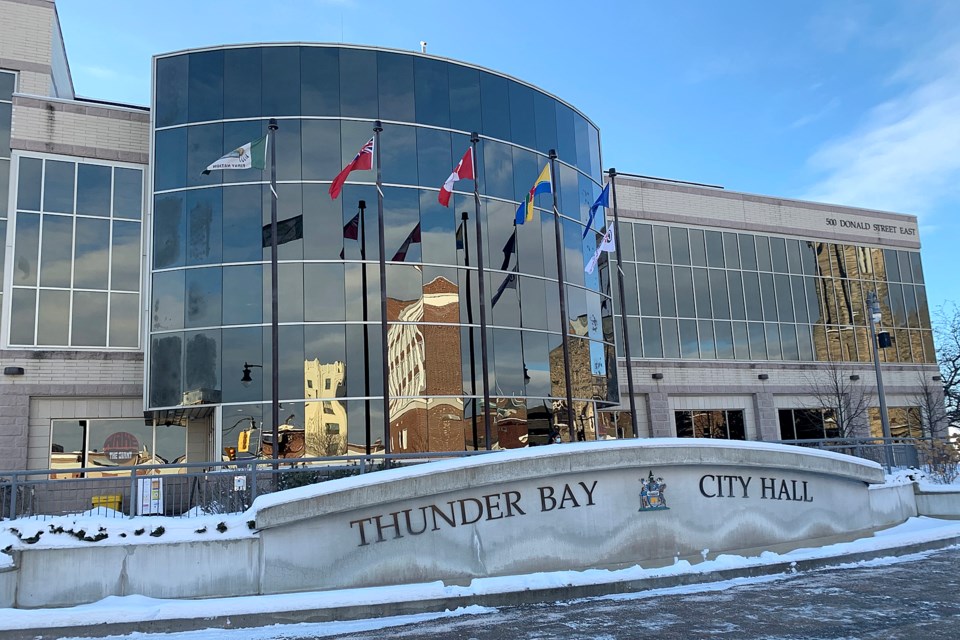THUNDER BAY – The City of Thunder Bay’s 2022 budget has been set with a final vote by city council Monday, though not without symbolic votes of dissent from two councillors.
The spending plan will increase the tax levy by 2.36 per cent or $4.9 million, after growth, expand key city departments – largely with provincial dollars – and boost infrastructure funding.
It includes significant increases to EMS and police spending, and will restructure and expand the bylaw enforcement division, hoping to ease policing demand.
Most councillors expressed satisfaction the city had managed to contain the tax hike while finding room for some new investments, despite next to non-existent growth.
“I’m fairly satisfied with where we’re landing,” said Brian Hamilton, noting where the city was paying for staffing expansions, like in the engineering department, that would support expanded services and infrastructure projects.
The McKellar ward councillor has expressed his excitement the budget included investments like an $8.7 investment to renew Parks & Open Spaces infrastructure, including work on the waterfront trail and a new accessible playground at Boulevard Lake Park. Much of that is supported with federal and provincial funds.
Couns. Peng You and Rebecca Johnson voted against ratifying the budget, saying they couldn’t approve a levy increase even slightly above a 2.25 per cent target council set in the summer.
“It’s not just dollars – it’s determination,” said You. “If we determine 2.25 [per cent], let’s stick with that number. That’s the reason I oppose the final [budget].”
Coun. Aldo Ruberto pushed back on those objections, saying no councillors had brought forward concrete ideas on how spending could be significantly reduced without impacting services.
“We’ve been looking for savings and savings,” he said. “When you say 2.25 [per cent], it’s hard to cut it down. Nobody’s really come forward with major cost savings. Our operations are slim as it is. I’m worried they’re going to suffer in the future.”
The city identified increased police spending, a $1 million capital spend financed by the levy, and expansions at licensing and enforcement, Pool 6, and Superior North EMS as major drivers of tax levy increases.
On the other hand, it found savings in lower insurance and legal expenses, an increased Ontario Municipal Partnership Fund allocation, and reductions at Thunder Bay Fire Rescue.
The levy increase before growth is 2.42 per cent, down a tick from the 2.44 per cent in the proposed budget released in early January.
The hike is barely eased by growth in the city's tax assessment base, which came in at $117,000 or just 0.06 per cent in 2021. That's less than ten per cent of the average growth rate the city has experienced over the past decade.
The impact of the tax levy increase will be felt differently by residents depending on factors like MPAC valuation and the education tax rate.
City council may be finished with the document, after weeks of debate, but it still contains a $7 million question mark. That’s the estimated impact of COVID-19 on city finances this year, thanks to lower revenues in areas like transit, recreation, and childcare, and increased staffing and cleaning costs.
If provincial and federal governments don’t step up with funding to make the city whole, as they did in 2020 and 2021, the city will drain over half of its $12 million stabilization reserve to cover those costs.
Council received written deputations from three citizens Monday. Two, Shane Judge and Vern Seymour, objected to the city’s approval of $2.4 million in the budget, drawn from reserves, to advance work on a proposed new police station.
Judge urged council to push for alternatives to a single building. The possibility has been assessed and found wanting twice before, in an initial consultants’ report for the police services board, and when council asked consultants to examine the possibility a second time.
A third deputation came from cycling advocate Ken Shields, who urged the city to move forward with a proposed $2.5 million investment for the Vickers-Carrick Bridge project, which would offer a long-sought north-south cycling connection.
Mayor Bill Mauro had proposed delaying that investment pending renewed talks with CN Rail over the potential to use its bridge parallel to Memorial Avenue, a cheaper and less disruptive option the company has previously rejected. With a new executive team in place at CN, the mayor argued it was worth another try.
“If CN wanted to show Thunder Bay how much of great corporate citizen they were they could have offered to work with the city years ago,” Shields wrote. “This stand-alone bridge project has been delayed and deferred many times and will only get more expensive over time.”
Council narrowly approved a delay to launch talks with CN on Monday, however, on a 6-5 vote.
Coun. Mark Bentz argued the benefits of a partnership were worth risking a slight delay to the Vickers-Carrick project. He suggested the agreement offered new corporate leadership an opportunity to rehabilitate its tarnished image in the community.
“The only downside of this that I see is a slight delay in the project if we’re not successful,” he said. “I’m hopeful we’ll be successful. I think we can present a pretty strong argument to CN that they would be doing this community a great service, and they would boost their profile within the community. What company does not want a win-win?”
